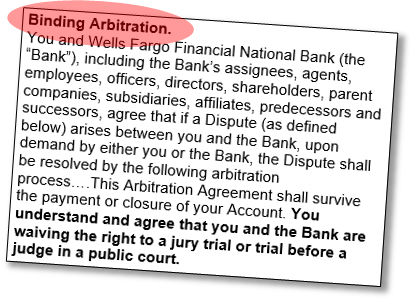-
Tips for becoming a good boxer - November 6, 2020
-
7 expert tips for making your hens night a memorable one - November 6, 2020
-
5 reasons to host your Christmas party on a cruise boat - November 6, 2020
-
What to do when you’re charged with a crime - November 6, 2020
-
Should you get one or multiple dogs? Here’s all you need to know - November 3, 2020
-
A Guide: How to Build Your Very Own Magic Mirror - February 14, 2019
-
Our Top Inspirational Baseball Stars - November 24, 2018
-
Five Tech Tools That Will Help You Turn Your Blog into a Business - November 24, 2018
-
How to Indulge on Vacation without Expanding Your Waist - November 9, 2018
-
5 Strategies for Businesses to Appeal to Today’s Increasingly Mobile-Crazed Customers - November 9, 2018
CFPB Proposes Changes to Arbitration Clauses
The rule would prevent companies from placing a mandatory-arbitration clause – which many banks and credit-card companies now use – in new contracts to prevent consumers from filing class-action lawsuits. “Consumers rarely file individual lawsuits or arbitration cases to obtain such relief”.
Advertisement
Until now, US bank customers had signed away their right to sue their bank in court, often without being aware of it.
On Thursday, the Consumer Financial Protection Bureau proposed powerful new rules that, if approved, will prohibit class-action bans in contracts for consumer financial products. “The CFPB’s proposal is created to protect consumers’ right to pursue justice and relief, and deter companies from violating the law”.
Democratic presidential candidate Hillary Clinton is endorsing the Consumer Financial Protection Bureau’s plan to ban mandatory arbitration provisions in credit card and bank contracts.
The CFPB is proposing rules that would restrict the use of so-called mandatory arbitration clauses, which prevent customers from collectively taking complaints before a judge and instead require the use of private arbitrators, a process that often favors large corporations.
“Where these clauses exist, either side can generally block lawsuits from proceeding in court”, Goldberg stated. The outcomes of most arbitration cases are kept private, with consumers having to sign confidentiality agreements. A New York Times investigation revealed that from 2010-2014, only 505 consumers chose to enter arbitration over disputes of $2,500 or less.
On May 5, the CFPB announced its proposed rule that would prohibit class-action waivers in arbitration clauses in contracts governing consumer finance products. In 2015, the agency released a study detailing the results of its evaluation, where it found that at least 160 million consumers were eligible for some form of relief over the course of five years.
About 6.8 million consumers receive $220 million in payments from class action settlements each year, the CFPB found.
Speaking of abuse of power, I was presented with such an arbitration-clause contract a few months ago.
“No matter how many consumers are injured by the same conduct, consumers must proceed to resolve their claims individually against the company”, the CFPB said in explaining its reasoning for the new rules.
Critics of the CFPB’s ban say the proposal will only benefit class-action lawyers and lead to very big paydays.
So, even though Saunders supports the proposed rule, she said it doesn’t go far enough. Unfortunately, most consumers don’t realize that their rights are being violated by this practice. Often the harm may be too small to make it practical for a single consumer to pursue an individual dispute, even when the cumulative harm to all affected consumers is significant.
In class actions, people band together to sue over the same alleged wrongdoing as a way to make the lawsuit more affordable.
Hammar was on the panel with Paul Bland of Public Justice; Deepak Gupta of Gupta Wessler PLLC; Christine Hines of the National Association of Consumer Advocates; Kaplinsky of Ballard Spahr LLC; and Travis Norton of the U.S. Chamber of Commerce. Buried in the fine print of credit card agreements, bank accounts and insurance policies are what are known as binding, or mandatory, arbitration clauses. The CFPB said it would use the records to monitor arbitration and that it would publish redacted records on its website.
Another point of dispute when it comes to arbitration is whether the process is fair.
Advertisement
The proposed rule will likely take effect in 2017, after a 90-day public comment period and then publication of CFPB’s final rule.





























